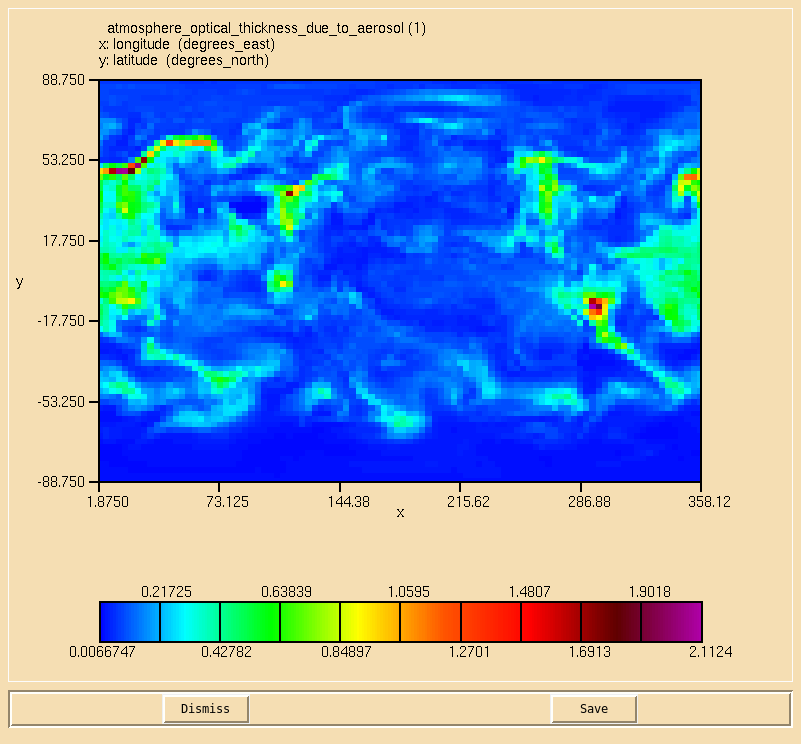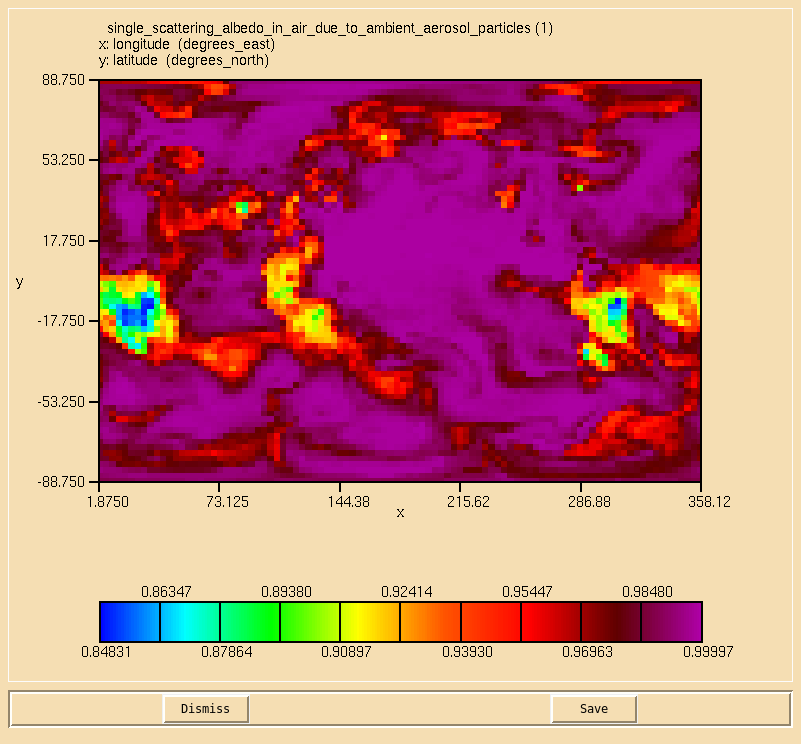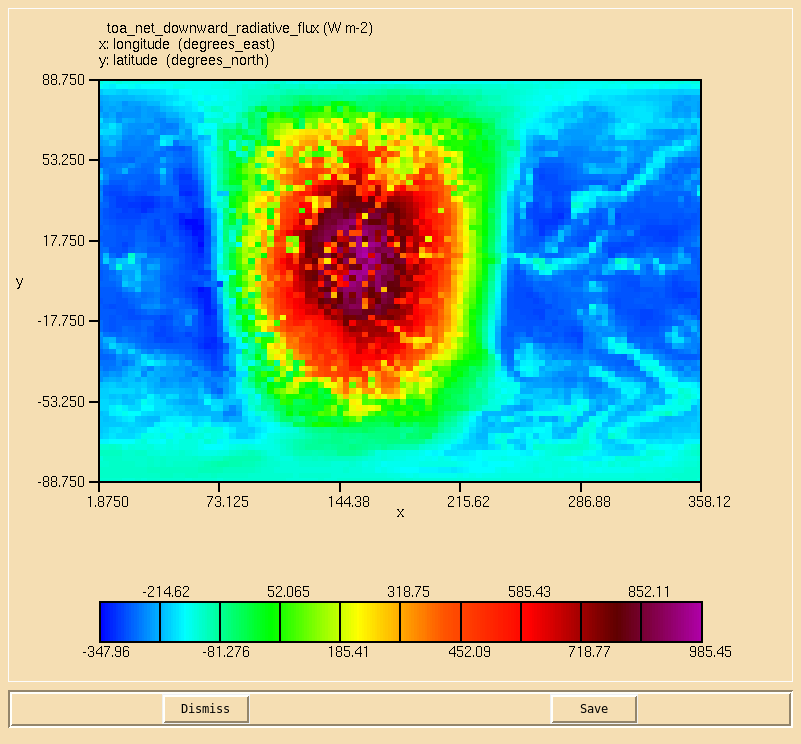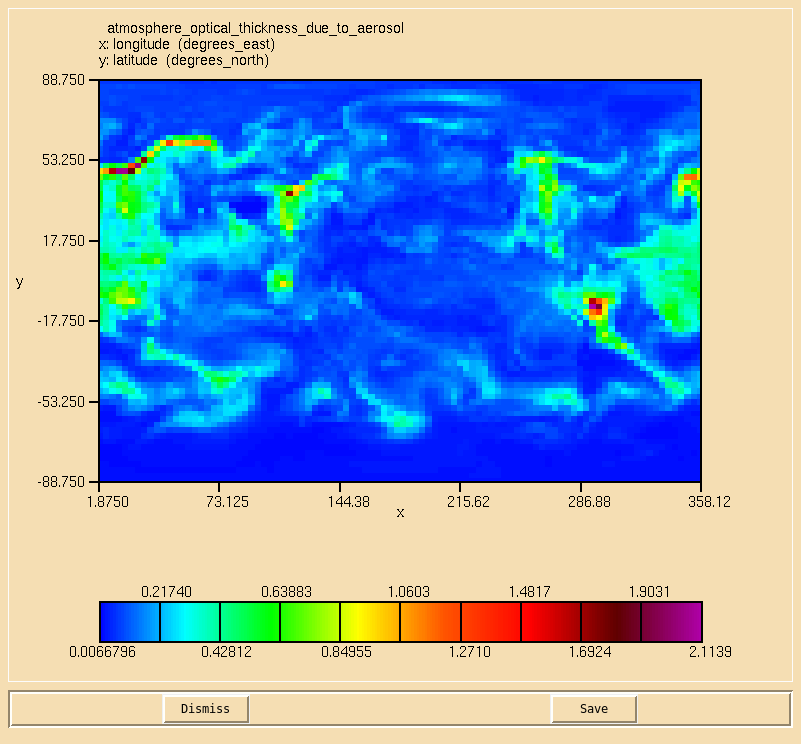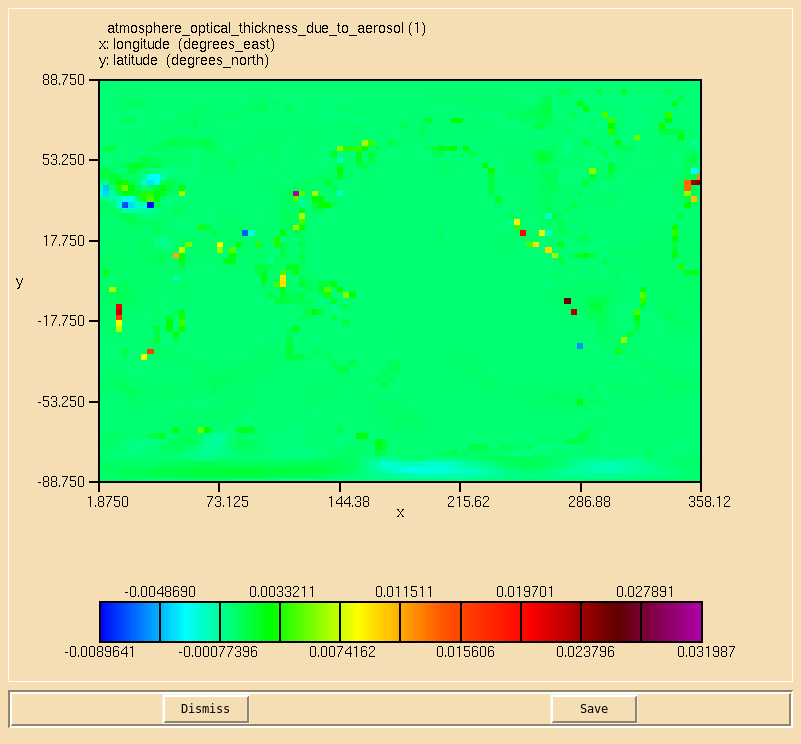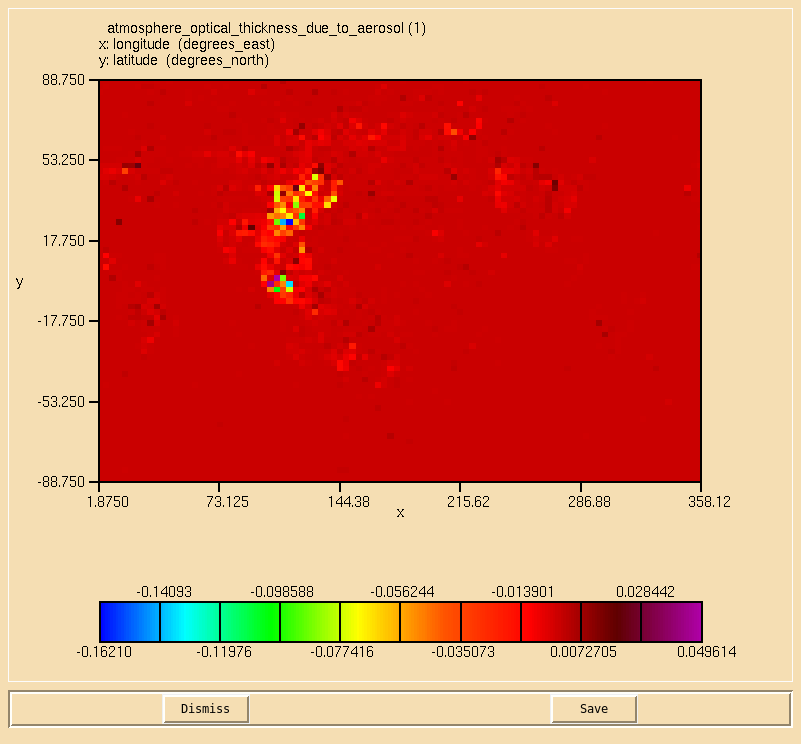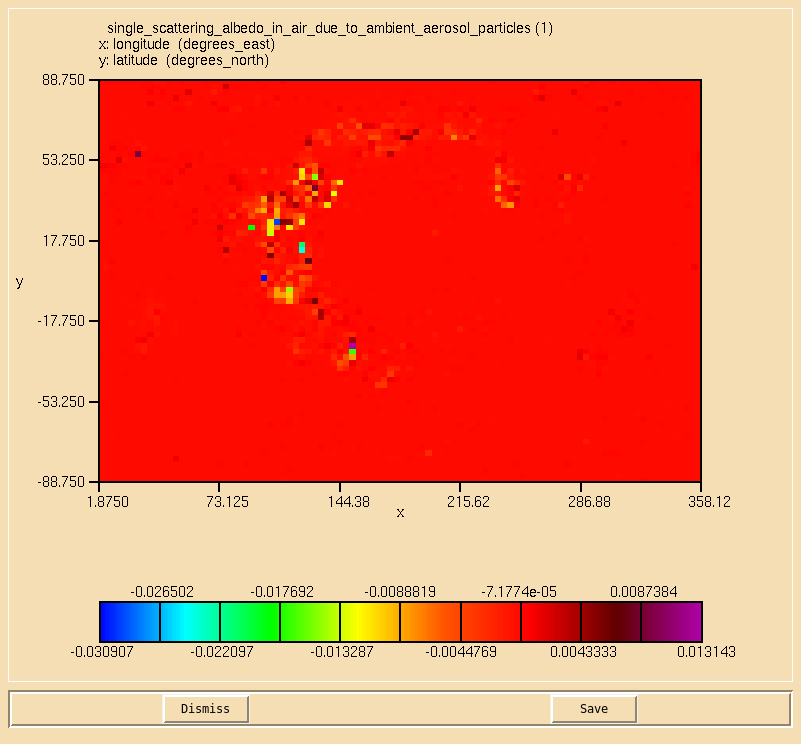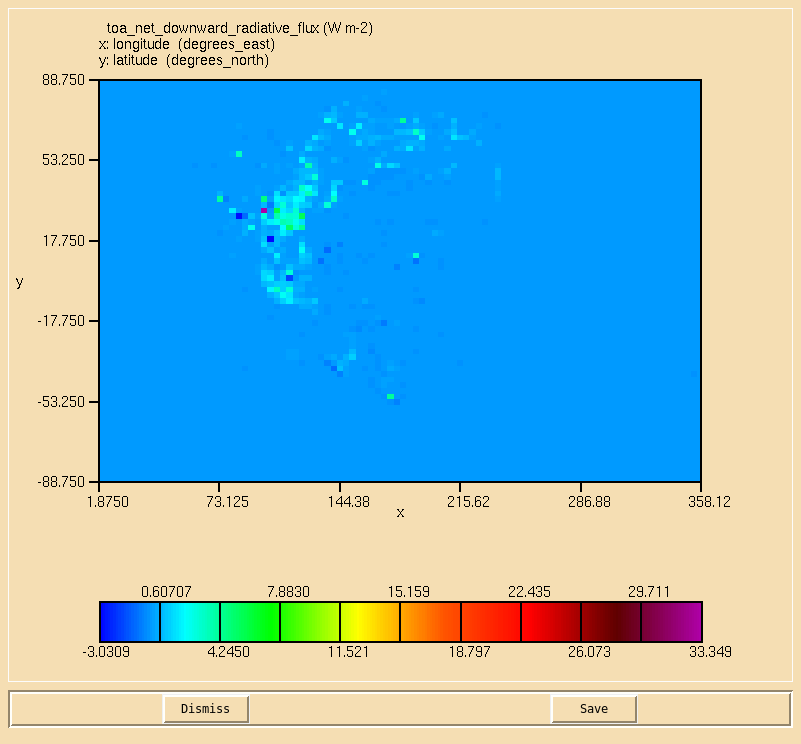UKCA Chemistry and Aerosol vn10.9 Tutorial 10
UKCA Chemistry and Aerosol Tutorials at vn10.9
What you will learn in this Tutorial
In this tutorial you will learn how to output and process aerosol diagnostics from UKCA.
Note that this Tutorial makes extensive use of Python to process the UM output. Example python scripts are provided for each Task, and you should take the time to read through these and understand what they are doing.
Task 10.1: Output aerosol diagnostics
TASK 10.1: Output the following aerosol and radiation diagnostics to the UPA output stream. You should make a new time profile (called TRAD) to only output these on radiation timesteps. You will also need to make a new domain profile (called D3DAR) for s02i530 and s02i540.
| Hint |
|---|
| You can find the number of radiation timesteps in a 24-hour period at: um namelist UM Science Settings Section 01 - 02 Radiation Shortwave. |
| STASH Section | STASH Item | STASH Name |
|---|---|---|
| 1 | 207 | INCOMING SW RAD FLUX (TOA): ALL TSS |
| 1 | 208 | OUTGOING SW RAD FLUX (TOA) |
| 2 | 205 | OUTGOING LW RAD FLUX (TOA) |
| 2 | 285 | MINERAL DUST OPTICAL DEPTH IN RADN. |
| 2 | 300 | AITKEN MODE (SOLUBLE) OPTICAL DEPTH |
| 2 | 301 | ACCUM MODE (SOLUBLE) OPTICAL DEPTH |
| 2 | 302 | COARSE MODE (SOLUBLE) OPTICAL DEPTH |
| 2 | 303 | AITKEN MODE (INSOL) OPTICAL DEPTH |
| 2 | 304 | ACCUM MODE (INSOL) OPTICAL DEPTH |
| 2 | 305 | COARSE MODE (INSOL) OPTICAL DEPTH |
| 2 | 585 | MINERAL DUST ABS. OPICAL DEPTH |
| 2 | 240 | AITKEN (SOLUBLE) ABS OPTICAL DEPTH |
| 2 | 241 | ACCUM (SOLUBLE) ABS OPTICAL DEPTH |
| 2 | 242 | COARSE (SOLUBLE) ABS OPTICAL DEPTH |
| 2 | 243 | AITKEN (INSOL) ABS OPTICAL DEPTH |
| 2 | 244 | ACCUM (INSOL) ABS OPTICAL DEPTH |
| 2 | 245 | COARSE (INSOL) ABS OPTICAL DEPTH |
| 2 | 530 | UKCA 3D AEROSOL EXTINCTION |
| 2 | 540 | CLASSIC 3D AEROSOL EXTINCTION |
Solution to Task 10.1
You were given the task
- Output the following aerosol and radiation diagnostics to the UPA output stream. You should make a new time profile (called TRAD) to only output these on radiation timesteps. You will also need to make a new domain profile (called D3DAR) for s02i530 and s02i540.
| STASH Section | STASH Item | STASH Name |
|---|---|---|
| 1 | 207 | INCOMING SW RAD FLUX (TOA): ALL TSS |
| 1 | 208 | OUTGOING SW RAD FLUX (TOA) |
| 2 | 205 | OUTGOING LW RAD FLUX (TOA) |
| 2 | 285 | MINERAL DUST OPTICAL DEPTH IN RADN. |
| 2 | 300 | AITKEN MODE (SOLUBLE) OPTICAL DEPTH |
| 2 | 301 | ACCUM MODE (SOLUBLE) OPTICAL DEPTH |
| 2 | 302 | COARSE MODE (SOLUBLE) OPTICAL DEPTH |
| 2 | 303 | AITKEN MODE (INSOL) OPTICAL DEPTH |
| 2 | 304 | ACCUM MODE (INSOL) OPTICAL DEPTH |
| 2 | 305 | COARSE MODE (INSOL) OPTICAL DEPTH |
| 2 | 585 | MINERAL DUST ABS. OPICAL DEPTH |
| 2 | 240 | AITKEN (SOLUBLE) ABS OPTICAL DEPTH |
| 2 | 241 | ACCUM (SOLUBLE) ABS OPTICAL DEPTH |
| 2 | 242 | COARSE (SOLUBLE) ABS OPTICAL DEPTH |
| 2 | 243 | AITKEN (INSOL) ABS OPTICAL DEPTH |
| 2 | 244 | ACCUM (INSOL) ABS OPTICAL DEPTH |
| 2 | 245 | COARSE (INSOL) ABS OPTICAL DEPTH |
| 2 | 530 | UKCA 3D AEROSOL EXTINCTION |
| 2 | 540 | CLASSIC 3D AEROSOL EXTINCTION |
and were given the hint
- You can find the number of radiation timesteps in a 24-hour period at: um namelist UM Science Settings Section 01 - 02 Radiation Shortwave.
For a working Rose suite that has completed this task, please see
- ARCHER:
u-as292@62651 - vm:
u-as297@62631
The specific Rose changes made are:
- ARCHER: https://code.metoffice.gov.uk/trac/roses-u/changeset/62651/a/s/2/9/2/trunk
- vm: https://code.metoffice.gov.uk/trac/roses-u/changeset/62631/a/s/2/9/7/trunk
The specific Rose changes made are:
ARCHER:
Index: app/um/rose-app.conf =================================================================== --- app/um/rose-app.conf (revision 60289) +++ app/um/rose-app.conf (revision 62651) @@ -2744,6 +2744,40 @@ precip_segment_size=32 ukca_mode_seg_size=4 +[namelist:umstash_domain(d3dar_72578706)] +dom_name='D3DAR' +!!iest=0 +ilevs=1 +imn=0 +imsk=1 +!!inth=0 +iopa=1 +iopl=2 +!!isth=0 +!!iwst=0 +iwt=0 +!!l_spml_ts=.false. +levb=01 +!!levlst=0 +levt=85 +plt=4 +pslist=1,2,3,4,5,6 +!!rlevlst=0 +!!spml_bot=0 +!!spml_ew=0 +!!spml_ns=0 +!!spml_top=0 +!!tblim=0 +!!tblimr=0 +!!telim=0 +!!tnlim=0 +ts=.false. +!!tslim=0 +!!tsnum=0 +!!ttlim=0 +!!ttlimr=0 +!!twlim=0 + [namelist:umstash_domain(dallrh_0496a967)] dom_name='DALLRH' !!iest=0 @@ -3025,6 +3059,22 @@ tim_name='TALLTS' use_name='UPUKCA' +[namelist:umstash_streq(01207_ed72c304)] +dom_name='DIAG' +isec=1 +item=207 +package= +tim_name='TRAD' +use_name='UPA' + +[namelist:umstash_streq(01208_83140cd8)] +dom_name='DIAG' +isec=1 +item=208 +package= +tim_name='TRAD' +use_name='UPA' + [namelist:umstash_streq(01235_3511dd9f)] dom_name='DIAG' isec=1 @@ -3033,14 +3083,142 @@ tim_name='TALLTS' use_name='UPUKCA' -[namelist:umstash_streq(02301_0f7c5f4a)] +[namelist:umstash_streq(02205_357bf644)] +dom_name='DIAG' +isec=2 +item=205 +package= +tim_name='TRAD' +use_name='UPA' + +[namelist:umstash_streq(02240_d97aaab7)] dom_name='DIAGAOT' isec=2 +item=240 +package=' ' +tim_name='TRAD' +use_name='UPA' + +[namelist:umstash_streq(02241_8cda3169)] +dom_name='DIAGAOT' +isec=2 +item=241 +package=' ' +tim_name='TRAD' +use_name='UPA' + +[namelist:umstash_streq(02242_91e371db)] +dom_name='DIAGAOT' +isec=2 +item=242 +package=' ' +tim_name='TRAD' +use_name='UPA' + +[namelist:umstash_streq(02243_21bc5f11)] +dom_name='DIAGAOT' +isec=2 +item=243 +package=' ' +tim_name='TRAD' +use_name='UPA' + +[namelist:umstash_streq(02244_32fe0790)] +dom_name='DIAGAOT' +isec=2 +item=244 +package=' ' +tim_name='TRAD' +use_name='UPA' + +[namelist:umstash_streq(02245_da00b6ef)] +dom_name='DIAGAOT' +isec=2 +item=245 +package=' ' +tim_name='TRAD' +use_name='UPA' + +[namelist:umstash_streq(02285_1d9800f0)] +dom_name='DIAGAOT' +isec=2 +item=285 +package=' ' +tim_name='TRAD' +use_name='UPA' + +[namelist:umstash_streq(02300_8b9907b5)] +dom_name='DIAGAOT' +isec=2 +item=300 +package=' ' +tim_name='TRAD' +use_name='UPA' + +[namelist:umstash_streq(02301_b8711d23)] +dom_name='DIAGAOT' +isec=2 item=301 -package='UKCA Testing' -tim_name='T3HMN' +package=' ' +tim_name='TRAD' use_name='UPA' +[namelist:umstash_streq(02302_420d0ec7)] +dom_name='DIAGAOT' +isec=2 +item=302 +package=' ' +tim_name='TRAD' +use_name='UPA' + +[namelist:umstash_streq(02303_ad5c3af4)] +dom_name='DIAGAOT' +isec=2 +item=303 +package=' ' +tim_name='TRAD' +use_name='UPA' + +[namelist:umstash_streq(02304_8c1869b6)] +dom_name='DIAGAOT' +isec=2 +item=304 +package=' ' +tim_name='TRAD' +use_name='UPA' + +[namelist:umstash_streq(02305_9ecd020a)] +dom_name='DIAGAOT' +isec=2 +item=305 +package=' ' +tim_name='TRAD' +use_name='UPA' + +[namelist:umstash_streq(02530_7a218781)] +dom_name='D3DAR' +isec=2 +item=530 +package=' ' +tim_name='TRAD' +use_name='UPA' + +[namelist:umstash_streq(02540_56484a28)] +dom_name='D3DAR' +isec=2 +item=540 +package=' ' +tim_name='TRAD' +use_name='UPA' + +[namelist:umstash_streq(02585_38287367)] +dom_name='DIAGAOT' +isec=2 +item=585 +package=' ' +tim_name='TRAD' +use_name='UPA' + [namelist:umstash_streq(03025_c8768f77)] dom_name='DIAG' isec=3 @@ -3551,6 +3729,25 @@ !!unt2=2 unt3=1 +[namelist:umstash_time(trad_4c3a45a7)] +!!iedt=0 +iend=-1 +ifre=3 +!!intv=0 +!!ioff=0 +iopt=1 +!!isam=0 +!!isdt=0 +!!iser=0 +istr=1 +!!itimes=0 +ityp=1 +!!lts0=.false. +tim_name='TRAD' +!!unt1=2 +!!unt2=2 +unt3=1 + [namelist:umstash_use(upa_ffb3f00b)] file_id='pp0' locn=3
These differences can be found in the file /home/ukca/Tutorial/vn10.9/worked_solutions/Task10.1/Task10.1_rose.patch on PUMA.
vm:
Index: app/um/rose-app.conf =================================================================== --- app/um/rose-app.conf (revision 60286) +++ app/um/rose-app.conf (revision 62631) @@ -2849,6 +2849,40 @@ !!ttlimr=0.0 !!twlim=0 +[namelist:umstash_domain(d3dar_72578706)] +dom_name='D3DAR' +!!iest=0 +ilevs=1 +imn=0 +imsk=1 +!!inth=0 +iopa=1 +iopl=2 +!!isth=0 +!!iwst=0 +iwt=0 +!!l_spml_ts=.false. +levb=01 +!!levlst=0 +levt=85 +plt=4 +pslist=1,2,3,4,5,6 +!!rlevlst=0 +!!spml_bot=0 +!!spml_ew=0 +!!spml_ns=0 +!!spml_top=0 +!!tblim=0 +!!tblimr=0 +!!telim=0 +!!tnlim=0 +ts=.false. +!!tslim=0 +!!tsnum=0 +!!ttlim=0 +!!ttlimr=0 +!!twlim=0 + [namelist:umstash_domain(dallrh_0496a967)] dom_name='DALLRH' !!iest=0 @@ -3617,6 +3651,22 @@ tim_name='TALLTS' use_name='UPUKCA' +[namelist:umstash_streq(01207_ed72c304)] +dom_name='DIAG' +isec=1 +item=207 +package= +tim_name='TRAD' +use_name='UPA' + +[namelist:umstash_streq(01208_83140cd8)] +dom_name='DIAG' +isec=1 +item=208 +package= +tim_name='TRAD' +use_name='UPA' + [namelist:umstash_streq(01235_3511dd9f)] dom_name='DIAG' isec=1 @@ -3625,14 +3675,142 @@ tim_name='TALLTS' use_name='UPUKCA' -[namelist:umstash_streq(02301_0f7c5f4a)] +[namelist:umstash_streq(02205_357bf644)] +dom_name='DIAG' +isec=2 +item=205 +package= +tim_name='TRAD' +use_name='UPA' + +[namelist:umstash_streq(02240_d97aaab7)] dom_name='DIAGAOT' isec=2 +item=240 +package=' ' +tim_name='TRAD' +use_name='UPA' + +[namelist:umstash_streq(02241_8cda3169)] +dom_name='DIAGAOT' +isec=2 +item=241 +package=' ' +tim_name='TRAD' +use_name='UPA' + +[namelist:umstash_streq(02242_91e371db)] +dom_name='DIAGAOT' +isec=2 +item=242 +package=' ' +tim_name='TRAD' +use_name='UPA' + +[namelist:umstash_streq(02243_21bc5f11)] +dom_name='DIAGAOT' +isec=2 +item=243 +package=' ' +tim_name='TRAD' +use_name='UPA' + +[namelist:umstash_streq(02244_32fe0790)] +dom_name='DIAGAOT' +isec=2 +item=244 +package=' ' +tim_name='TRAD' +use_name='UPA' + +[namelist:umstash_streq(02245_da00b6ef)] +dom_name='DIAGAOT' +isec=2 +item=245 +package=' ' +tim_name='TRAD' +use_name='UPA' + +[namelist:umstash_streq(02285_1d9800f0)] +dom_name='DIAGAOT' +isec=2 +item=285 +package=' ' +tim_name='TRAD' +use_name='UPA' + +[namelist:umstash_streq(02300_8b9907b5)] +dom_name='DIAGAOT' +isec=2 +item=300 +package=' ' +tim_name='TRAD' +use_name='UPA' + +[namelist:umstash_streq(02301_b8711d23)] +dom_name='DIAGAOT' +isec=2 item=301 -package='UKCA Testing' -tim_name='T3HMN' +package=' ' +tim_name='TRAD' use_name='UPA' +[namelist:umstash_streq(02302_420d0ec7)] +dom_name='DIAGAOT' +isec=2 +item=302 +package=' ' +tim_name='TRAD' +use_name='UPA' + +[namelist:umstash_streq(02303_ad5c3af4)] +dom_name='DIAGAOT' +isec=2 +item=303 +package=' ' +tim_name='TRAD' +use_name='UPA' + +[namelist:umstash_streq(02304_8c1869b6)] +dom_name='DIAGAOT' +isec=2 +item=304 +package=' ' +tim_name='TRAD' +use_name='UPA' + +[namelist:umstash_streq(02305_9ecd020a)] +dom_name='DIAGAOT' +isec=2 +item=305 +package=' ' +tim_name='TRAD' +use_name='UPA' + +[namelist:umstash_streq(02530_7a218781)] +dom_name='D3DAR' +isec=2 +item=530 +package=' ' +tim_name='TRAD' +use_name='UPA' + +[namelist:umstash_streq(02540_56484a28)] +dom_name='D3DAR' +isec=2 +item=540 +package=' ' +tim_name='TRAD' +use_name='UPA' + +[namelist:umstash_streq(02585_38287367)] +dom_name='DIAGAOT' +isec=2 +item=585 +package=' ' +tim_name='TRAD' +use_name='UPA' + [namelist:umstash_streq(03025_c8768f77)] dom_name='DIAG' isec=3 @@ -4504,6 +4682,25 @@ unt2=2 unt3=4 +[namelist:umstash_time(trad_4c3a45a7)] +!!iedt=0 +iend=-1 +ifre=3 +!!intv=0 +!!ioff=0 +iopt=1 +!!isam=0 +!!isdt=0 +!!iser=0 +istr=1 +!!itimes=0 +ityp=1 +!!lts0=.false. +tim_name='TRAD' +!!unt1=2 +!!unt2=2 +unt3=1 + [namelist:umstash_time(traddm_fa7c24ce)] !!iedt=0 iend=-1
If you open the .pa file in Xconv, you should see the following additional fields:
0 : 96 72 1 2 field200: INCOMING SW RAD FLUX (TOA): ALL TSS 1 : 96 72 1 2 field201: OUTGOING SW RAD FLUX (TOA) 2 : 96 72 1 2 olr: OUTGOING LW RAD FLUX (TOA) 3 : 96 72 6 2 unspecified: Stash code = 2240 4 : 96 72 6 2 unspecified: Stash code = 2241 5 : 96 72 6 2 unspecified: Stash code = 2242 6 : 96 72 6 2 unspecified: Stash code = 2243 7 : 96 72 6 2 unspecified: Stash code = 2244 8 : 96 72 6 2 unspecified: Stash code = 2245 9 : 96 72 6 2 unspecified: MINERAL DUST OPTICAL DEPTH IN RADN. 10 : 96 72 6 2 unspecified: AITKEN MODE (SOLUBLE) OPTICAL DEPTH 11 : 96 72 6 2 unspecified: ACCUM MODE (SOLUBLE) OPTICAL DEPTH 12 : 96 72 6 2 unspecified: COARSE MODE (SOLUBLE) OPTICAL DEPTH 13 : 96 72 6 2 unspecified: AITKEN MODE (INSOL) OPTICAL DEPTH 14 : 96 72 6 2 unspecified: ACCUM MODE (INSOL) OPTICAL DEPTH 15 : 96 72 6 2 unspecified: COARSE MODE (INSOL) OPTICAL DEPTH 16 : 96 72 38 2 unspecified: Stash code = 2530 17 : 96 72 38 2 unspecified: Stash code = 2530 18 : 96 72 38 2 unspecified: Stash code = 2530 19 : 96 72 38 2 unspecified: Stash code = 2530 20 : 96 72 38 2 unspecified: Stash code = 2530 21 : 96 72 38 2 unspecified: Stash code = 2530 22 : 96 72 38 2 unspecified: Stash code = 2540 23 : 96 72 38 2 unspecified: Stash code = 2540 24 : 96 72 38 2 unspecified: Stash code = 2540 25 : 96 72 38 2 unspecified: Stash code = 2540 26 : 96 72 38 2 unspecified: Stash code = 2540 27 : 96 72 38 2 unspecified: Stash code = 2540 28 : 96 72 6 2 unspecified: Stash code = 2585
Sample output from this task can be found at /work/n02/n02/ukca/Tutorial/vn10.9/sample_output/Task10.1/atmosa.pa19810901_00 on ARCHER.
Task 10.2: Calculate aerosol optical depth
TASK 10.2: Calculate the aerosol optical depth at 0.55 microns on the second radiation timestep.
| Hint |
|---|
| The UM calculate optical depth diagnostics on 6 pseudo levels corresponding to 0.38, 0.44, 0.55, 0.67, 0.87, and 1.02 microns, therefore 0.55 microns is pseudo level 3. |
Note: You will need to use the CLASSIC mineral dust optical depth diagnostic, as the configuration used in these tutorials does not use modal dust. Likewise, the insoluble accumulation and coarse mode diagnostics will be zero as these modes are not used in the configuration used here.
Python script
To calculate the total aerosol optical depth at 0.55 microns, you should sum up the contribution from the different aerosol components.
On ARCHER, an example python script to do this has been provided at /work/n02/n02/ukca/Tutorial/vn10.9/sample_output/Task10.2/write_AOD.py:
#!/usr/bin/env python # This file is part of the UKCA Tutorials: # http://www.ukca.ac.uk/wiki/index.php/UKCA_Chemistry_and_Aerosol_Tutorials_at_vn10.9 # Copyright (C) 2017 University of Cambridge # This is free software: you can redistribute it and/or modify it under the # terms of the GNU Lesser General Public License as published by the Free # Software Foundation, either version 3 of the License, or (at your option) # any later version. # It is distributed in the hope that it will be useful, but WITHOUT ANY # WARRANTY; without even the implied warranty of MERCHANTABILITY or FITNESS FOR # A PARTICULAR PURPOSE. See the GNU Lesser General Public License for more # details. # You find a copy of the GNU Lesser General Public License at <http://www.gnu.org/licenses/>. # Written by N. Luke Abraham 2017-12-11 <nla27@cam.ac.uk> # preamble import iris import iris.time fname='/work/n02/n02/ukca/Tutorial/vn10.9/sample_output/Task10.1/atmosa.pa19810901_00' # constraint on time to get 2nd radiation timestep tconstr=iris.Constraint(time=lambda cell: cell.point.hour == 2) # load all AOD components at 0.55 micron # must use this way of loading to account for constraint on time with iris.FUTURE.context(cell_datetime_objects=True): aod=iris.load(fname,[ iris.Constraint(pseudo_level=3) & iris.AttributeConstraint(STASH='m01s02i285') & tconstr, iris.Constraint(pseudo_level=3) & iris.AttributeConstraint(STASH='m01s02i300') & tconstr, iris.Constraint(pseudo_level=3) & iris.AttributeConstraint(STASH='m01s02i301') & tconstr, iris.Constraint(pseudo_level=3) & iris.AttributeConstraint(STASH='m01s02i302') & tconstr, iris.Constraint(pseudo_level=3) & iris.AttributeConstraint(STASH='m01s02i303') & tconstr, iris.Constraint(pseudo_level=3) & iris.AttributeConstraint(STASH='m01s02i304') & tconstr, iris.Constraint(pseudo_level=3) & iris.AttributeConstraint(STASH='m01s02i305') & tconstr]) # make cube to store total AOD aodsum=aod[0].copy() # add-up components aodsum.data=aod[0].data+aod[1].data+aod[2].data+aod[3].data+aod[4].data+aod[5].data+aod[6].data # rename aodsum.rename('atmosphere_optical_thickness_due_to_aerosol') # remove unlimited dimension when writing to netCDF iris.FUTURE.netcdf_no_unlimited=True # output to netCDF iris.save(aodsum,'Task102_AOD.nc',netcdf_format='NETCDF3_CLASSIC')
You should edit this script to point to your UM output file, and will need to
module load anaconda/2.2.0-python2
before running it, e.g.
python -c 'execfile("write_AOD.py")'
Solution to Task 10.2
You were asked to
- Calculate the aerosol optical depth at 0.55 microns on the second radiation timestep.
and were given the hint
- The UM calculate optical depth diagnostics on 6 pseudo levels corresponding to 0.38, 0.44, 0.55, 0.67, 0.87, and 1.02 microns, therefore 0.55 microns is pseudo level 3.
You should make use of the python script provided to do this.
Sample output from this task can be found in the /work/n02/n02/ukca/Tutorial/vn10.9/sample_output/Task10.2/ directory on ARCHER, containing the following:
Task102_AOD.nc write_AOD.py
Task 10.3: Calculate the single-scattering albedo
TASK 10.3: Calculate the single-scattering albedo at 0.55 microns on the second radiation timestep, defined as:
Python script
To calculate the single-scattering albedo at 0.55 microns, you should sum up the contribution to AAOD and AOD from the different aerosol components.
On ARCHER, an example python script to do this has been provided at /work/n02/n02/ukca/Tutorial/vn10.9/sample_output/Task10.3/write_SSA.py:
#!/usr/bin/env python # This file is part of the UKCA Tutorials: # http://www.ukca.ac.uk/wiki/index.php/UKCA_Chemistry_and_Aerosol_Tutorials_at_vn10.9 # Copyright (C) 2017 University of Cambridge # This is free software: you can redistribute it and/or modify it under the # terms of the GNU Lesser General Public License as published by the Free # Software Foundation, either version 3 of the License, or (at your option) # any later version. # It is distributed in the hope that it will be useful, but WITHOUT ANY # WARRANTY; without even the implied warranty of MERCHANTABILITY or FITNESS FOR # A PARTICULAR PURPOSE. See the GNU Lesser General Public License for more # details. # You find a copy of the GNU Lesser General Public License at <http://www.gnu.org/licenses/>. # Written by N. Luke Abraham 2017-12-11 <nla27@cam.ac.uk> # preamble import iris import iris.time fname='/work/n02/n02/ukca/Tutorial/vn10.9/sample_output/Task10.1/atmosa.pa19810901_00' # constraint on time to get 2nd radiation timestep tconstr=iris.Constraint(time=lambda cell: cell.point.hour == 2) # load all AOD & AAOD components at 0.55 micron # must use this way of loading to account for constraint on time with iris.FUTURE.context(cell_datetime_objects=True): aod=iris.load(fname,[ iris.Constraint(pseudo_level=3) & iris.AttributeConstraint(STASH='m01s02i285') & tconstr, iris.Constraint(pseudo_level=3) & iris.AttributeConstraint(STASH='m01s02i300') & tconstr, iris.Constraint(pseudo_level=3) & iris.AttributeConstraint(STASH='m01s02i301') & tconstr, iris.Constraint(pseudo_level=3) & iris.AttributeConstraint(STASH='m01s02i302') & tconstr, iris.Constraint(pseudo_level=3) & iris.AttributeConstraint(STASH='m01s02i303') & tconstr, iris.Constraint(pseudo_level=3) & iris.AttributeConstraint(STASH='m01s02i304') & tconstr, iris.Constraint(pseudo_level=3) & iris.AttributeConstraint(STASH='m01s02i305') & tconstr]) aaod=iris.load(fname,[ iris.Constraint(pseudo_level=3) & iris.AttributeConstraint(STASH='m01s02i585') & tconstr, iris.Constraint(pseudo_level=3) & iris.AttributeConstraint(STASH='m01s02i240') & tconstr, iris.Constraint(pseudo_level=3) & iris.AttributeConstraint(STASH='m01s02i241') & tconstr, iris.Constraint(pseudo_level=3) & iris.AttributeConstraint(STASH='m01s02i242') & tconstr, iris.Constraint(pseudo_level=3) & iris.AttributeConstraint(STASH='m01s02i243') & tconstr, iris.Constraint(pseudo_level=3) & iris.AttributeConstraint(STASH='m01s02i244') & tconstr, iris.Constraint(pseudo_level=3) & iris.AttributeConstraint(STASH='m01s02i245') & tconstr]) # make cube to store total AOD aodsum=aod[0].copy() # add-up components aodsum.data=aod[0].data+aod[1].data+aod[2].data+aod[3].data+aod[4].data+aod[5].data+aod[6].data # make cube to store total AAOD aaodsum=aaod[0].copy() # add-up components aaodsum.data=aaod[0].data+aaod[1].data+aaod[2].data+aaod[3].data+aaod[4].data+aaod[5].data+aaod[6].data # calculate single-scattering albedo ssa=aodsum.copy() ssa.data = 1.0 - (aaodsum.data/aodsum.data) # rename ssa.rename('single_scattering_albedo_in_air_due_to_ambient_aerosol_particles') # remove unlimited dimension when writing to netCDF iris.FUTURE.netcdf_no_unlimited=True # output to netCDF iris.save(ssa,'Task103_SSA.nc',netcdf_format='NETCDF3_CLASSIC')
Solution to Task 10.3
You were asked to
- Calculate the single-scattering albedo at 0.55 microns on the second radiation timestep, defined as:
You should use the python script provided to do this.
Sample output from this task can be found in the /work/n02/n02/ukca/Tutorial/vn10.9/sample_output/Task10.3/ directory on ARCHER, containing the following:
Task103_SSA.nc write_SSA.py
Task 10.4: Calculate the top of the atmosphere net downward radiative flux
TASK 10.4: Calculate the net downward top of the atmosphere radiative flux on the second radiation timestep.
Python script
To calculate the net TOA downward radiative flux, you should sum up the outgoing contributions from shortwave and longwave radiation, and take this away from the incoming shortwave radiative flux.
On ARCHER, an example python script to do this has been provided at /work/n02/n02/ukca/Tutorial/vn10.9/sample_output/Task10.4/write_TOA.py:
#!/usr/bin/env python # This file is part of the UKCA Tutorials: # http://www.ukca.ac.uk/wiki/index.php/UKCA_Chemistry_and_Aerosol_Tutorials_at_vn10.9 # Copyright (C) 2017 University of Cambridge # This is free software: you can redistribute it and/or modify it under the # terms of the GNU Lesser General Public License as published by the Free # Software Foundation, either version 3 of the License, or (at your option) # any later version. # It is distributed in the hope that it will be useful, but WITHOUT ANY # WARRANTY; without even the implied warranty of MERCHANTABILITY or FITNESS FOR # A PARTICULAR PURPOSE. See the GNU Lesser General Public License for more # details. # You find a copy of the GNU Lesser General Public License at <http://www.gnu.org/licenses/>. # Written by N. Luke Abraham 2017-12-11 <nla27@cam.ac.uk> # preamble import iris import iris.time fname='/work/n02/n02/ukca/Tutorial/vn10.9/sample_output/Task10.1/atmosa.pa19810901_00' # constraint on time to get 2nd radiation timestep tconstr=iris.Constraint(time=lambda cell: cell.point.hour == 2) # load all TOA components at 0.55 micron # must use this way of loading to account for constraint on time with iris.FUTURE.context(cell_datetime_objects=True): isw=iris.load_cube(fname,[iris.AttributeConstraint(STASH='m01s01i207') & tconstr]) osw=iris.load_cube(fname,[iris.AttributeConstraint(STASH='m01s01i208') & tconstr]) olw=iris.load_cube(fname,[iris.AttributeConstraint(STASH='m01s02i205') & tconstr]) # make cube to store net downward TOA flux toa=isw.copy() # add-up components toa.data=isw.data - (osw.data + olw.data) toa.rename('toa_net_downward_radiative_flux') # remove unlimited dimension when writing to netCDF iris.FUTURE.netcdf_no_unlimited=True # output to netCDF iris.save(toa,'Task104_TOA.nc',netcdf_format='NETCDF3_CLASSIC')
Solution to Task 10.4
You were asked to
- Calculate the net downward top of the atmosphere radiative flux on the second radiation timestep.
You should use the python script provided to do this.
Sample output from this task can be found in the /work/n02/n02/ukca/Tutorial/vn10.9/sample_output/Task10.4/ directory on ARCHER, containing the following:
Task104_TOA.nc write_TOA.py
Task 10.5: Calculate aerosol optical depth from the 3D aerosol extinction
TASK 10.5: Using the 3D aerosol extinction, calculate the 0.55 micron aerosol optical depth on the second radiation timestep, and compare this to your AOD from Task 10.2.
| Hint |
|---|
| You will need to include contributions from both UKCA and CLASSIC (due to the dust scheme). |
| Remember to correctly calculate the grid-cell heights. |
Python script
To calculate the AOD from the aerosol extinction, you will need to integrate this in the column. To do this you should first multiply by the height of each grid-cell before summing-up.
On ARCHER, an example python script to do this has been provided at /work/n02/n02/ukca/Tutorial/vn10.9/sample_output/Task10.5/calc_AOD.py:
#!/usr/bin/env python # This file is part of the UKCA Tutorials: # http://www.ukca.ac.uk/wiki/index.php/UKCA_Chemistry_and_Aerosol_Tutorials_at_vn10.9 # Copyright (C) 2017 University of Cambridge # This is free software: you can redistribute it and/or modify it under the # terms of the GNU Lesser General Public License as published by the Free # Software Foundation, either version 3 of the License, or (at your option) # any later version. # It is distributed in the hope that it will be useful, but WITHOUT ANY # WARRANTY; without even the implied warranty of MERCHANTABILITY or FITNESS FOR # A PARTICULAR PURPOSE. See the GNU Lesser General Public License for more # details. # You find a copy of the GNU Lesser General Public License at <http://www.gnu.org/licenses/>. # Written by N. Luke Abraham 2017-12-11 <nla27@cam.ac.uk> # preamble import iris import iris.time import iris.analysis import numpy as np fname='/work/n02/n02/ukca/Tutorial/vn10.9/sample_output/Task10.1/atmosa.pa19810901_00' # constraint on time to get 2nd radiation timestep tconstr=iris.Constraint(time=lambda cell: cell.point.hour == 2) # load orography to enable correct calculation of level heights orog=iris.load_cube( '/work/n02/n02/hum/ancil/atmos/n48e/orography/globe30/v1/qrparm.orog', iris.AttributeConstraint(STASH='m01s00i033')) # load all extinction components at 0.55 micron # must use this way of loading to account for constraint on time with iris.FUTURE.context(cell_datetime_objects=True): ukca=iris.load_cube(fname,[ iris.Constraint(pseudo_level=3) & iris.AttributeConstraint(STASH='m01s02i530') & tconstr]) classic=iris.load_cube(fname,[ iris.Constraint(pseudo_level=3) & iris.AttributeConstraint(STASH='m01s02i540') & tconstr]) # Calculate the correct height of each cell # add the orography as an auxillary coordinate auxcoord=iris.coords.AuxCoord(orog.data,standard_name=str(orog.standard_name),long_name="orography",var_name="orog",units=orog.units) # added in to lat/lon (ht=0,lat=1,lon=2) ukca.add_aux_coord(auxcoord,(1,2,)) # now calculate the correct altitude above sea-level factory=iris.aux_factory.HybridHeightFactory(delta=ukca.coord("level_height"),sigma=ukca.coord("sigma"),orography=ukca.coord("surface_altitude")) # now create the 'altitude' derrived coordinate ukca.add_aux_factory(factory) # now calculate the height from the bounds bounds = ukca.coord('altitude').bounds[:,:,:,1] - ukca.coord('altitude').bounds[:,:,:,0] # mutliply by the height of each cell ukca.data = ukca.data * bounds classic.data = classic.data * bounds # now sum up the column ukca_int=ukca.collapsed('model_level_number',iris.analysis.SUM) classic_int=classic.collapsed('model_level_number',iris.analysis.SUM) # add together aod=ukca_int.copy() aod.data = ukca_int.data + classic_int.data # rename aod.rename('atmosphere_optical_thickness_due_to_aerosol') # remove unlimited dimension when writing to netCDF iris.FUTURE.netcdf_no_unlimited=True # output to netCDF iris.save(aod,'Task105_AOD.nc',netcdf_format='NETCDF3_CLASSIC')
On ARCHER, an example python script to calculate the difference from this AOD and the AOD calculated in Task10.2 is also provided at /work/n02/n02/ukca/Tutorial/vn10.9/sample_output/Task10.5/diff_AOD_methods.py:
#!/usr/bin/env python # This file is part of the UKCA Tutorials: # http://www.ukca.ac.uk/wiki/index.php/UKCA_Chemistry_and_Aerosol_Tutorials_at_vn10.9 # Copyright (C) 2017 University of Cambridge # This is free software: you can redistribute it and/or modify it under the # terms of the GNU Lesser General Public License as published by the Free # Software Foundation, either version 3 of the License, or (at your option) # any later version. # It is distributed in the hope that it will be useful, but WITHOUT ANY # WARRANTY; without even the implied warranty of MERCHANTABILITY or FITNESS FOR # A PARTICULAR PURPOSE. See the GNU Lesser General Public License for more # details. # You find a copy of the GNU Lesser General Public License at <http://www.gnu.org/licenses/>. # Written by N. Luke Abraham 2017-12-11 <nla27@cam.ac.uk> # preamble import iris dname='./Task102_AOD.nc' cname='./Task105_AOD.nc' diag=iris.load_cube(dname) calc=iris.load_cube(cname) # difference the fields calc.data=calc.data - diag.data # remove unlimited dimension when writing to netCDF iris.FUTURE.netcdf_no_unlimited=True # output to netCDF iris.save(calc,'Task105_AOD_diff.nc',netcdf_format='NETCDF3_CLASSIC')
Solution to Task 10.5
You were asked to
- Using the 3D aerosol extinction, calculate the 0.55 micron aerosol optical depth on the second radiation timestep, and compare this to your AOD from Task 10.2.
and were given the hints
- You will need to include contributions from both UKCA and CLASSIC (due to the dust scheme).
- Remember to correctly calculate the grid-cell heights.
You should use the python script provided to do this.
Note that there will be some small differences between these two fields, especially around coastlines.
Sample output from this task can be found in the /work/n02/n02/ukca/Tutorial/vn10.9/sample_output/Task10.5/ directory on ARCHER, containing the following:
Task105_AOD.nc Task105_AOD_diff.nc calc_AOD.py diff_AOD_methods.py
Task 10.6: Calculate the difference in aerosol impacts when Sec_Org is no longer formed from ALICE
TASK 10.6: You should now remove the formation of Sec_Org from the chemical reaction added in Task 6.1, giving
and assess the impact this has on the aerosol diagnostics calculated in the previous tasks, 10.2, 10.3, and 10.4.
| Hint |
|---|
Remember to remove Sec_Org from the diagnostics as well as the reaction.
|
Note: as this a very short run (that is still spinning-up) and you will only be considering a single timestep, the results will be incredibly noisy.
Solution to Task 10.6
For a working Rose suite that has completed this task, please see
- ARCHER:
u-as292@62669 - vm:
u-as297@62632
The specific Rose changes made are:
- ARCHER: https://code.metoffice.gov.uk/trac/roses-u/changeset/62669/a/s/2/9/2/trunk
- vm: https://code.metoffice.gov.uk/trac/roses-u/changeset/62632/a/s/2/9/7/trunk
The specific Rose changes made are:
ARCHER:
Index: app/fcm_make/rose-app.conf =================================================================== --- app/fcm_make/rose-app.conf (revision 62651) +++ app/fcm_make/rose-app.conf (revision 62669) @@ -42,4 +42,4 @@ stash_version=1A timer_version=3A um_rev=vn10.9 -um_sources=branches/dev/lukeabraham/vn10.9_UKCA_Tutorial_Solns@46718 +um_sources=branches/dev/lukeabraham/vn10.9_UKCA_Tutorial_Solns@47380
These differences can be found in the file /home/ukca/Tutorial/vn10.9/worked_solutions/Task10.6/Task10.6_rose.patch on PUMA.
vm:
Index: app/fcm_make/rose-app.conf =================================================================== --- app/fcm_make/rose-app.conf (revision 62631) +++ app/fcm_make/rose-app.conf (revision 62632) @@ -42,4 +42,4 @@ stash_version=1A timer_version=3A um_rev=vn10.9 -um_sources=branches/dev/lukeabraham/vn10.9_UKCA_Tutorial_Solns@46718 +um_sources=branches/dev/lukeabraham/vn10.9_UKCA_Tutorial_Solns@47380
The specific UM changes made are:
Index: src/atmosphere/UKCA/asad_flux_dat.F90
===================================================================
--- src/atmosphere/UKCA/asad_flux_dat.F90 (revision 46718)
+++ src/atmosphere/UKCA/asad_flux_dat.F90 (revision 47380)
@@ -1287,9 +1287,9 @@
TYPE(asad_flux_defn), PARAMETER, PUBLIC :: &
ukca_tutorial_fluxes(3) = (/ &
-asad_flux_defn('RXN',50134,'B',.FALSE.,0,4, &
+asad_flux_defn('RXN',50134,'B',.FALSE.,0,3, &
(/'ALICE ','OH '/), &
-(/'BOB ','Sec_Org ',' ',' '/)), &
+(/'BOB ',' ',' ',' '/)), &
asad_flux_defn('DEP',50135,'D',.FALSE.,0,1, &
(/'ALICE ',' '/), &
(/' ',' ',' ',' '/)), &
Index: src/atmosphere/UKCA/ukca_chem_master.F90
===================================================================
--- src/atmosphere/UKCA/ukca_chem_master.F90 (revision 46718)
+++ src/atmosphere/UKCA/ukca_chem_master.F90 (revision 47380)
@@ -2156,7 +2156,7 @@
'HCHO ',1.00e-12, 0.00, 0.00, 1.00, 0.75, 0.25, 2.75, TI,0,0,107),&
ratb_t1(277,'MACRO2 ','MeOO ','HO2 ','CO ',' ',&
' ',1.00e-12, 0.00, 0.00, 1.17, 0.25, 0.00, 0.00, TI,0,0,107),&
-ratb_t1(278,'ALICE ','OH ','BOB ','Sec_Org ',' ',&
+ratb_t1(278,'ALICE ','OH ','BOB ',' ',' ',&
' ',2.70E-11, 0.00, -390.00, 0.00, 0.00, 0.00, 0.00, ST,0,0,107) /)
!----------------------------------------------------------------------
These differences can be found in the file /home/ukca/Tutorial/vn10.9/worked_solutions/Task10.6/Task10.6_code.patch on PUMA.
Sample output from this task can be found in the /work/n02/n02/ukca/Tutorial/vn10.9/sample_output/Task10.6/ directory on ARCHER, containing the following:
Task106_AOD.nc Task106_AOD_diff.nc Task106_SSA.nc Task106_SSA_diff.nc Task106_TOA.nc Task106_TOA_diff.nc atmosa.pa19810901_00 diff_AOD_rxn.py diff_SSA_rxn.py diff_TOA_rxn.py
Checklist
- ☐
Written by Luke Abraham, Nicolas Bellouin, & Anja Schmidt 2017

